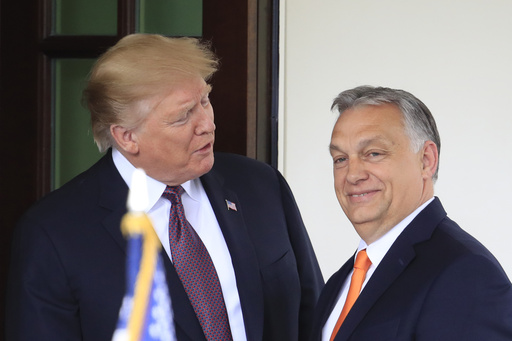NEW YORK (AP) — Hungary’s nationalist prime minister, Viktor Orbán, will travel to Florida on Thursday to meet with former President Donald Trump following a NATO summit in Washington, a move likely to aggravate frustrations among Western allies over similar secretive trips he made to Russia and China in recent days.
Orbán will meet with Trump at the former president’s beachside compound Mar-a-Lago, according to a person familiar with the plans who spoke on condition of anonymity to discuss the private event.
The Hungarian leader has openly endorsed Trump’s candidacy in this year’s presidential election, and pinned hopes on the Republican being able to bring an end to Russia’s war in Ukraine.
The EU’s longest-serving leader has become an icon to some conservative populists for championing what he calls “illiberal democracy,” which includes restrictions on immigration and LGBTQ+ rights. He has also cracked down on the press and judiciary in Hungary and been accused by the EU of violating rule-of-law and democracy standards.
The Mar-a-Lago meeting — Orbán’s second since March — comes as the latest stop on what he calls a “peace mission” aimed at finding a path toward ending Russia’s war in Ukraine.
Widely considered to have the warmest relations with the Kremlin among all EU leaders, Orbán made an unannounced visit to Kyiv last week where he held talks with Ukrainian President Volodymyr Zelenskyy.
Some of his critics interpreted the Kyiv visit as a sign that Hungary could take steps closer to the EU mainstream’s pro-Ukraine stance as it took over the bloc’s six-month rotating presidency earlier this month.
But those hopes were dashed when he made an unannounced trip to Moscow days later to meet with Russian President Vladimir Putin, a rare trip to Russia by a European leader that drew condemnation from Kyiv and other European capitals.
After that, he flew to Beijing to meet with Chinese President Xi Jinping, where he described China as a stabilizing force amid global turbulence and praised its “constructive and important” peace initiatives.
Speaking on the sidelines of the NATO summit on Thursday, Finnish President Alexander Stubb rebuked Orbán for his visits to Moscow and Beijing, which EU leaders have rushed to clarify were not endorsed by other European leaders.
“I’ll say it out loud, I don’t think there’s any point in having conversations with authoritarian regimes that are violating international law,” Stubb said. “He can do it on his own behalf. But I fundamentally disagree about doing that. I simply do not see the purpose.”
Orbán has sought close ties to Trump and other conservative Republicans, and expressed his belief that a new Trump presidency was the “only serious chance” for an end to the war in Ukraine.
Trump has repeatedly said he could settle the war “in 24 hours” if he’s elected president again by meeting with both Putin and Zelenskyy — a claim Russia’s United Nations ambassador has disputed.
In April 2023, when charges were filed in the first of Trump’s four criminal cases, Orbán posted a message of support for the former president urging him to “keep on fighting.” Trump in early 2022 said he was giving his “complete support and endorsement” to Orbán’s reelection campaign that year.
Some observers have raised concerns that Orbán’s pursuit of a separate foreign policy on Russia and China than that of his EU and NATO partners threatens to undermine those groups’ unity.
European governments, meanwhile, have engaged in deep consultations on what they could do to ensure that NATO, Western support for Ukraine and the security of individual NATO countries will endure should Trump — one of the military alliance’s most prominent critics — win back the presidency in November and temper U.S. contributions.
___
Spike reported from Budapest, Hungary. Lorne Cook in Brussels contributed reporting.
Source: post





